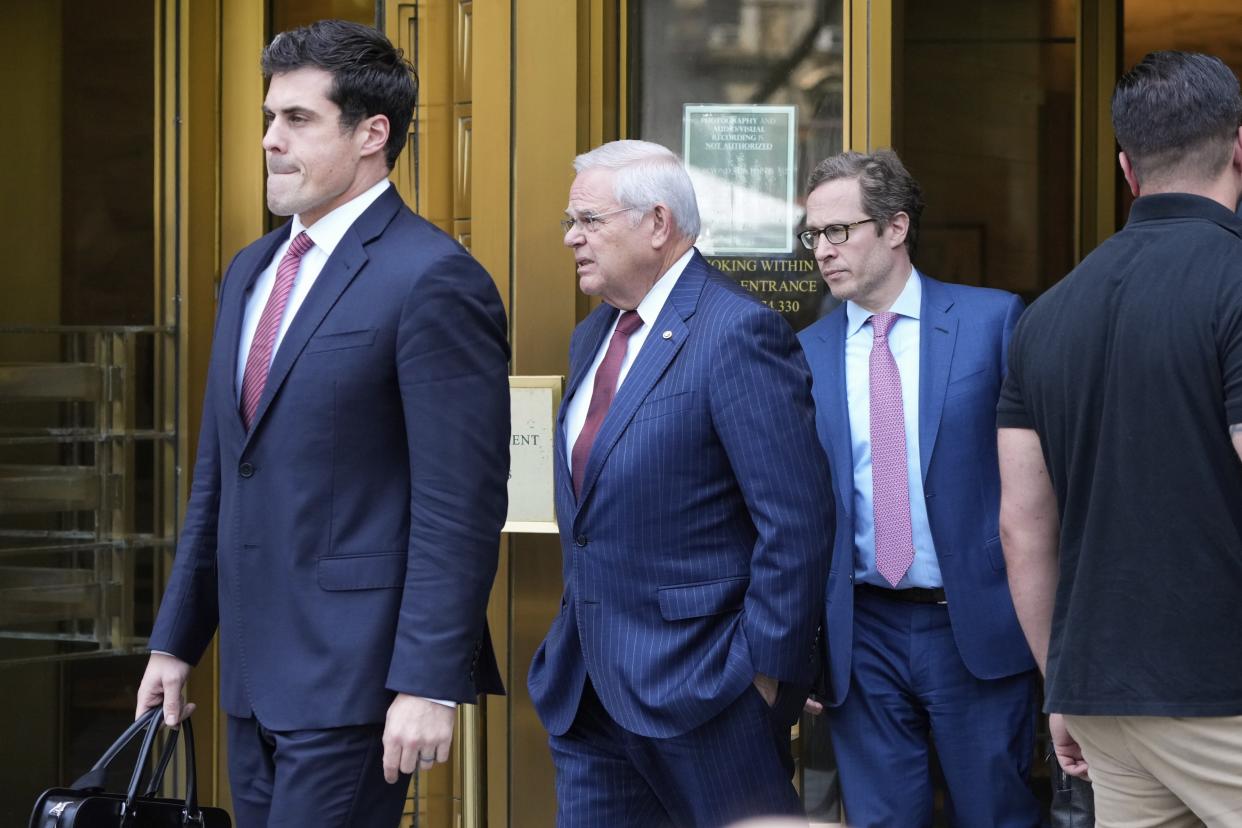The Menendez verdict is in, but the case isn’t over

- Oops!Something went wrong.Please try again later.
NEW YORK — Twelve New York jurors found Sen. Bob Menendez guilty on 16 different corruption charges, but nine Supreme Court justices may have final say on his fate.
Menendez and attorneys for a pair of co-defendants found guilty of bribing the senator said within minutes of the Tuesday verdict that they planned to appeal. But they indicated throughout the two-month trial that an appeal was almost certain if the jury found the defendants guilty.
Larry Lustberg, an attorney for a New Jersey real estate developer found guilty of bribing the senator with cash and gold bars, said he’ll appeal “as long and as high” as needed.
The defense attorneys’ bet may be that the high court, which has undone several of the most high-profile political corruption cases in recent years, will do so again.
Menendez’s legal team includes Yaakov Roth, who represented former Virginia Gov. Bob McDonnell in his bribery case and argued on behalf of “Bridgegate” defendant Bridget Kelly and former New York Gov. Andrew Cuomo aide Joseph Percoco at the Supreme Court — which overturned all three convictions.
One of Menendez’s attorneys said Tuesday that appeals would focus on “grave” issues from the trial.
Menendez, in particular, raised repeated concerns about evidence prosecutors tried to introduce that could step on lawmakers’ constitutional “speech or debate” privileges. The clause grants members of Congress a form of immunity that is mostly impenetrable in investigations relating to the official duties of lawmakers, their aides or other congressional officials.
Soon after the trial began in mid-May, Menendez’s attorneys asked for a mistrial on speech or debate grounds.
U.S. District Judge Sidney Stein’s “speech or debate” rulings created a paradox for prosecutors; each time the judge sided with them, he handed Menendez’s legal team more fodder for an appeal that might intrigue the Supreme Court.
As the trial wore on, the senator’s legal team won at least one speech or debate fight to exclude evidence that federal prosecutors said was “critical” to proving their allegations that Menendez took bribes to help the Egyptian government. (Even without that evidence, the jury found Menendez guilty of aiding Egypt.)
But Stein also found there were some other communications about legislative activity that prosecutors could show jurors. The judge ultimately let prosecutors introduce a text message Menendez received about a Senate resolution expressing appreciation for Qatar’s help evacuating refugees from Afghanistan. Prosecutors said Menendez wanted to help a real estate developer cement a multimillion-dollar deal with a member of the Qatari royal family.
The judge also allowed prosecutors to introduce evidence about the legislative activities of other senators, so long as their names are redacted or they are given a pseudonym, like “Senator 1.”
Even so, Menendez attorney Avi Weitzman said during the trial that showing the resolution to the jurors “is a speech or debate problem” that should not have been allowed in the case, suggesting possible grounds for appeal.
Stan Brand, a former counsel to the House of Representatives who argued speech or debate issues before the Supreme Court, said Menendez’s case could force the courts to revisit some of the key principles underlying Congress’ protections. That’s because the high court left ill-defined what it means to consider “future legislative action,” he said, meaning even staff discussions or analyses about future bills could be swept into prosecutions.
Another issue that may pique the interest of appeals court judges is whether Menendez took specific “official acts” in exchange for bribes.
Defense attorneys could attack that in several ways.
First, they could argue some of the senator’s actions were not official senatorial actions since some charges involved interactions Menendez had with officials in the Trump administration or at the state level — perhaps not squarely within his constitutional duties.
They could also argue that the speech or debate clause gives the senator immunity for official acts he does take and that acts it doesn’t protect him from aren’t official acts.
Finally, defense attorneys seem likely to challenge that the piles of cash and bars of gold bars found in Menendez’s home were bribes.
Prosecutors alleged a trio of New Jersey businesspeople bribed Menendez. One of the businesspeople pleaded guilty and testified against the others in the trial. The other two did not deny that they had given Menendez gifts but suggested they were not bribes but “goodwill gifts,” which are allowed.
Jurors were given a relatively unique instruction that the senator was allowed to receive such gifts — and they nonetheless found him guilty of bribes.
Still, the Supreme Court has wrestled repeatedly with what constitutes a quid pro quo and may do so again.
There’s a long way to go before the Supreme Court gets involved though.
In coming weeks, attorneys will try to get Stein to overturn some of the convictions using a more routine legal maneuver known as a motion for judgment of acquittal, which gives the judge powers to undo jury verdicts.
There are also more mundane legal issues, like whether the jury instructions were proper.
“I have every faith that the law and the facts did not sustain that decision and that we will be successful upon appeal,” Menendez told reporters outside the courthouse Tuesday. “I have never violated my public oath.”
But, for now, 12 jurors are certain beyond a reasonable doubt that he did.

